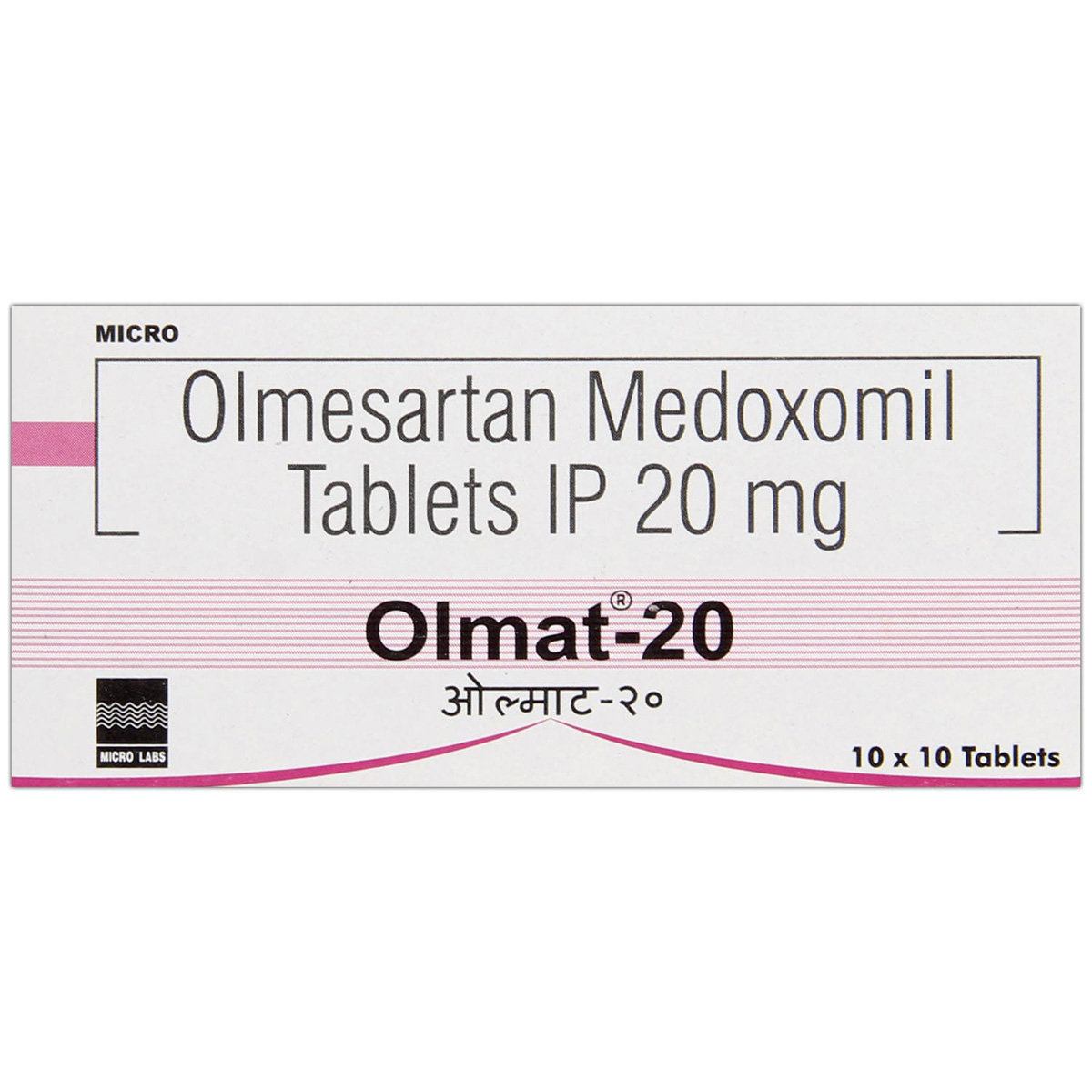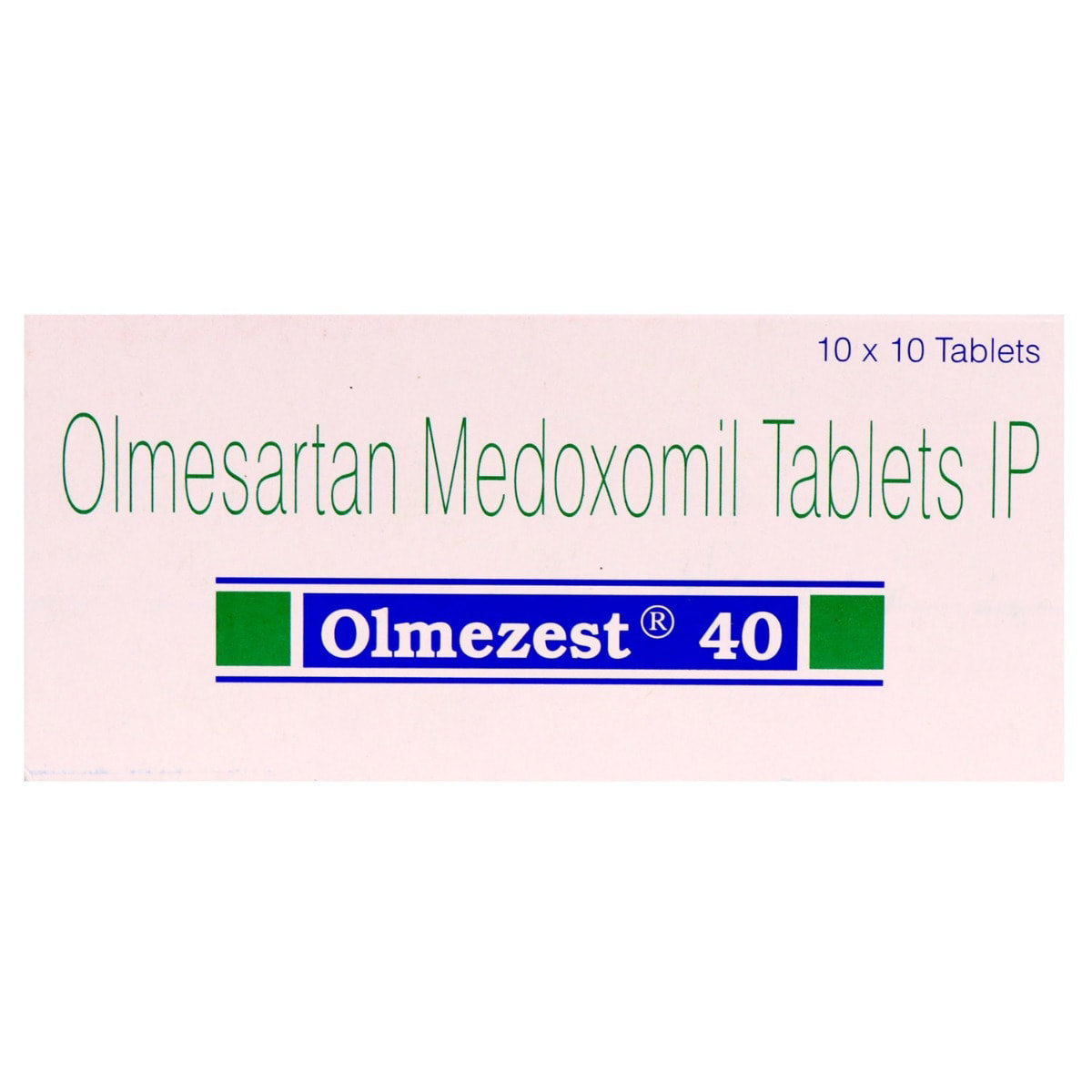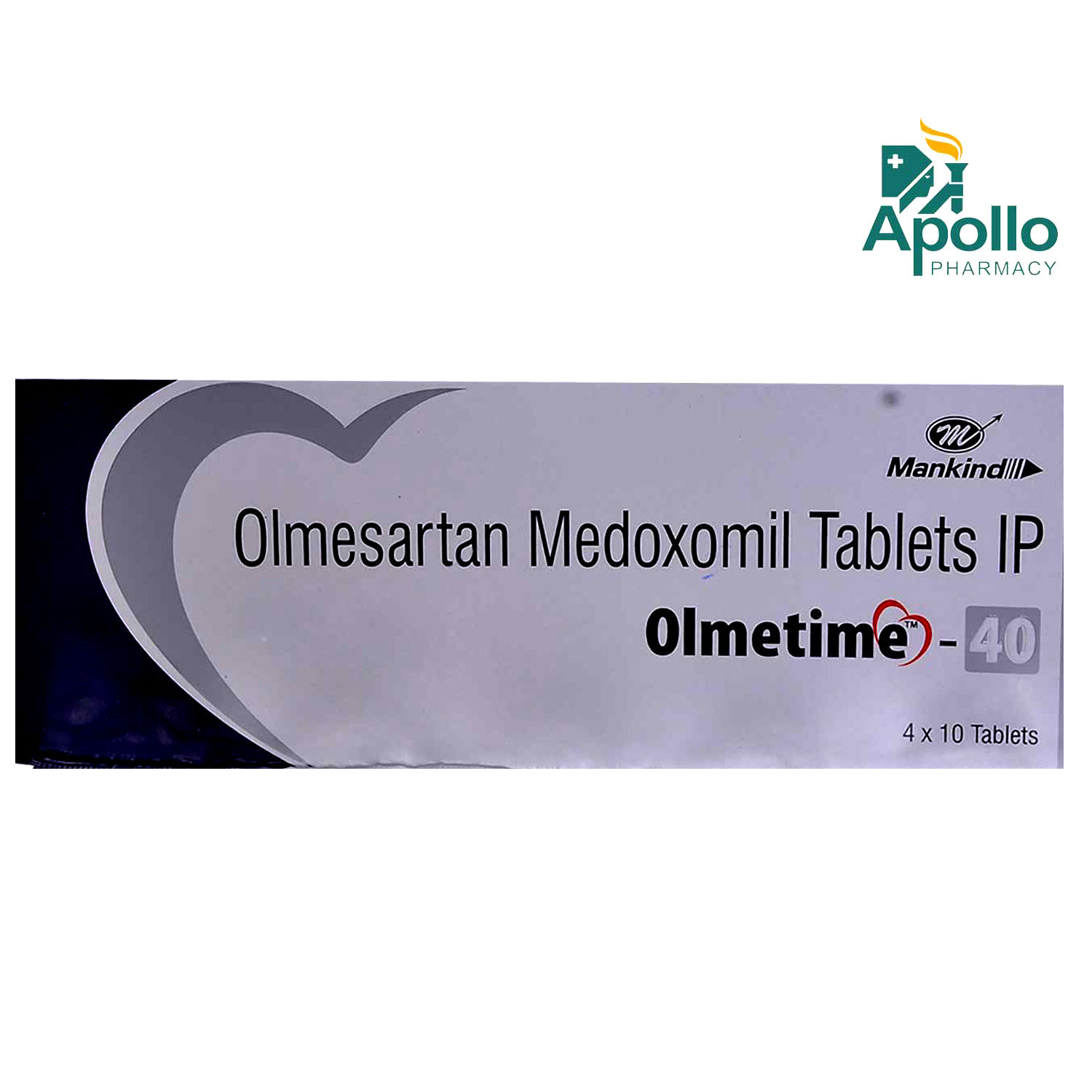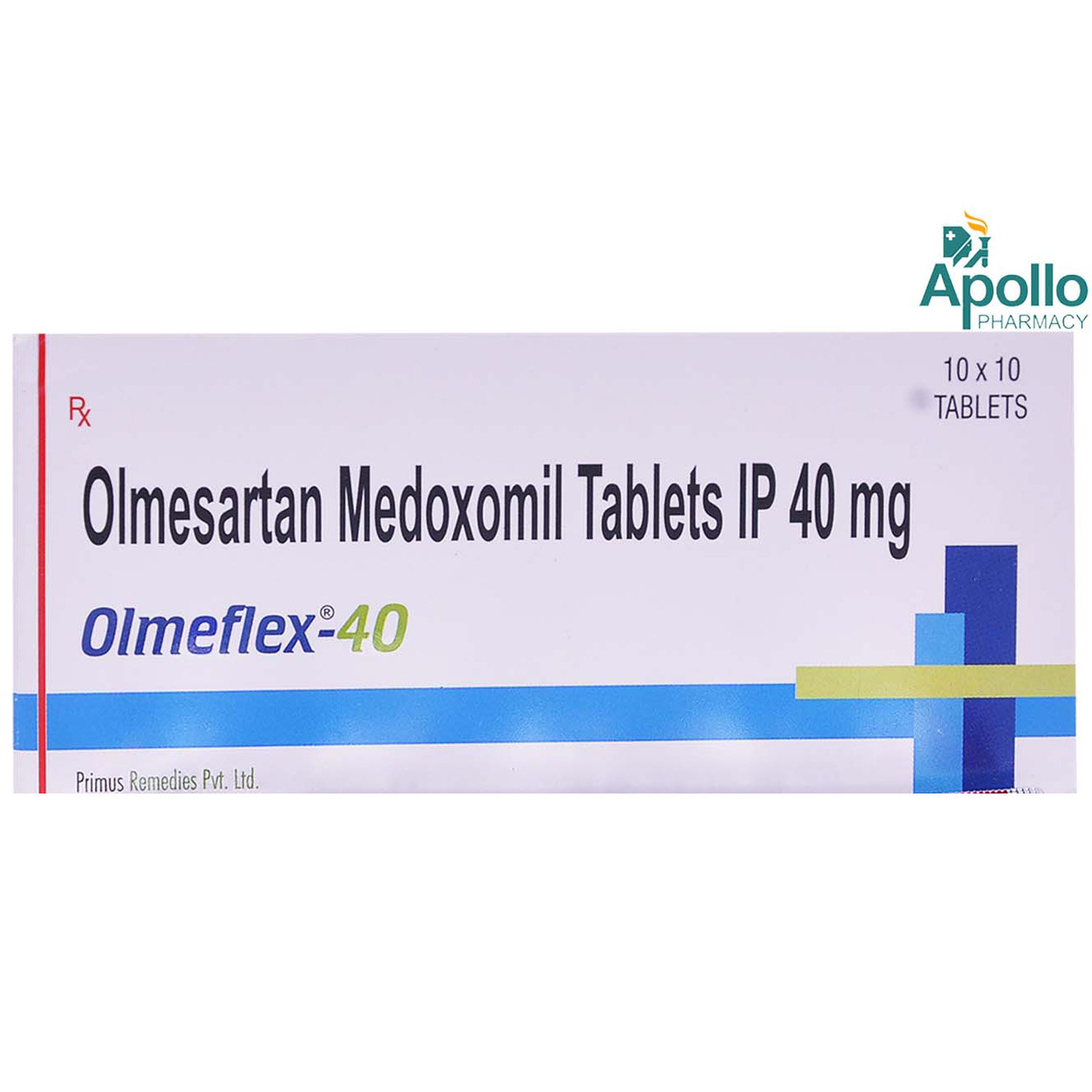Olmesartan
About Olmesartan
Olmesartan belongs to a group of medicines called angiotensin II receptor antagonists that are used for the treatment of hypertension (high blood pressure). Additionally, Olmesartan is used to reduce the risk of heart attack or stroke and kidney problems. Hypertension is a medical condition, in which the blood exerts high blood pressure against the walls of the blood vessels. Due to this, the heart has to work harder to pump the supply of blood in the whole body. On the other hand, heart attack or stroke occurs due to blocked blood flow to the heart or brain, respectively.
Olmesartan contains Olmesartan, and it is only available on prescription. It is an angiotensin receptor blocker (ARB). It works by blocking the hormone angiotensin, thereby relaxing blood vessels. This allows the blood to flow more smoothly and the heart to pump more efficiently.
You can take Olmesartan with or without food as prescribed by your doctor. It should be swallowed whole with a glass of water. Your doctor will advise you how often you take your tablets based on your medical conditions. You may experience dizziness, headache, nausea, indigestion, diarrhoea, stomach ache, gastroenteritis, upper respiratory infections in more cases. Most of these side effects of Olmesartan do not require medical attention and gradually resolve over time. However, if the side effects are persistent, reach out to your doctor.
Do not use potassium supplements or salt substitutes unless your doctor has told you. Olmesartan is not for pregnant women as its use during your pregnancy can cause injury and even death to your unborn baby. It is not known whether Olmesartan passes into breast milk or not. Please consult your doctor, and your doctor will decide if you will take Olmesartan while using Olmesartan breastfeeding together. Do not consume alcohol with Olmesartan as it may increase the risk of low blood pressure.
Uses of Olmesartan
Medicinal Benefits
Olmesartan is an angiotensin II receptor antagonist that blocks the action of a hormone called angiotensin I in the body that causes narrowing of blood vessels leading to high blood pressure-lowering high blood pressure by widening and relaxing blood vessels. Olmesartan is used to treat high blood pressure and reduce the risk of heart attack or stroke. This medicine needs to be taken regularly to be effective.
Directions for Use
Storage
Side Effects of Olmesartan
- Dizziness
- Headache
- Nausea
- Indigestion
- Diarrhea
- Stomach pain
- Tiredness
- Sore throat
- Runny or stuffy nose
- Flu-like symptoms
Drug Warnings
Olmesartan is not recommended for people who have allergic with Olmesartan have impaired kidney function, diabetes, liver problems, pregnant women, or planning to get pregnant and breastfeeding women. Olmesartan may increase the risk of low blood pressure when taken with alcohol. Besides this, it is contraindicated in low blood pressure (hypotension), cardiogenic shock (sudden stopping of blood flow to the heart), and aortic stenosis (heart valve problem). Avoid intake of potassium supplements with Olmesartan as it may lead to high potassium levels in the blood, so the doctor may ask you to have a regular check of your potassium level. Taking Olmesartan with painkillers can increase the risk of kidney problems and reduces the efficacy of Olmesartan.
Drug Interactions
Drug-Drug Interaction: Olmesartan interact with other medicines to help lower your blood pressure (aliskiren, enalapril, captopril, lisinopril, ramipril), anti-inflammatories (aspirin, ibuprofen, naproxen, diclofenac), diuretics (amiloride, bumetanide, furosemide), arthritis medicines (celecoxib, etoricoxib) a medicine for mental health problems (lithium), blood thinner (heparin), a medicine to treat heart failure (spironolactone), a medicine for lowering cholesterol (colesevelam).
Drug-Food Interaction: Olmesartan may interact with potassium supplements resulting in hyperkalemia (high level of potassium in the blood). It may cause severe adverse effects such as irregular heartbeat, muscle paralysis, and kidney failure.
Drug-Disease Interaction: People with diabetes, cholestasis (liver disease due to the blocked flow of bile) or impaired kidney function should consult a doctor before taking Olmesartan.
Drug-Drug Interactions Checker List:
Safety Advice

Alcohol
unsafeYou are recommended to avoid consumption of alcohol while taking Olmesartan as it may increase the risk of low blood pressure and cause adverse effects such as dizziness, fainting, light-headedness, or headache.

Pregnancy
unsafeOlmesartan is unsafe to use during pregnancy since it affects the fetus. Please consult your doctor if you are planning to become pregnant or already pregnant before starting Olmesartan.

Breast Feeding
cautionThe safe use of Olmesartan in breastfeeding mothers has not yet been established. So, it should be used in breastfeeding women only when prescribed by a doctor.

Driving
cautionOlmesartan may cause dizziness or tiredness in some people. So, make sure you are not affected before driving or operating machinery.

Liver
cautionTake Olmesartan with caution, especially if you have a history of liver diseases/conditions. The dose may be adjusted by your doctor as required. Olmesartan is not recommended for patients with severe liver disease.

Kidney
cautionTake Olmesartan with caution, especially if you have a history of kidney diseases/conditions. The dose may be adjusted by your doctor as required. Olmesartan is not recommended for patients with severe kidney disease.

Children
cautionOlmesartan is not recommended for children below 6 years as the safety and effectiveness in children not established.
Habit Forming
Diet & Lifestyle Advise
- Keep your weight under control with BMI 19.5-24.9.
- Limit intake of sodium chloride (table salt) in your daily diet and minimize eating processed foods as they contain more sodium. Try to replace salt with spices or herbs to add flavour to the food.
- Monitor your blood pressure daily and if there is too much fluctuation, then immediately contact your doctor.
- Try to include heart-healthy omega-3 fatty acids containing food drinks in your daily diet. You can also use low-fat cooking oil like olive oil, soybean oil, canola oil, and coconut oil to lower your elevated blood.
- Chronic stress may also cause high blood pressure. Therefore, avoid stress by chain your expectations, the way you react in certain situations, and making time for yourself to do activities that you enjoy.
- Do regular exercise for at least 150 minutes per week, or about 30 minutes most days of the week. Doing this can help you to lower your raised blood pressure by about 5 mm of Hg.
- Quitting smoking is the best strategy to lower the risk of heart disease.
Special Advise
- Monitor your blood pressure regularly and if you notice any fluctuations, please consult your doctor.
- A low salt diet and regular exercise are recommended along with Olmesartan for effective results.
Patients Concern
Disease/Condition Glossary
Hypertension: It is a chronic condition when blood pressure is too high. Blood pressure is defined as the amount of blood pumped by the heart and the amount of resistance exerted by the arteries against the blood flow. If the heart pumps more blood then arteries become narrower and in turn blood pressure becomes high. If blood pressure becomes uncontrolled, then it may cause serious heart disease including stroke and heart attack. Additionally, high blood pressure also causes brain damage (stroke), and kidney failure. Blood pressure is expressed by systolic and diastolic. Systolic blood pressure represents the contraction and relaxation of the heart. Diastolic represents the pressure in the vessels when the heart beats and in a resting state. Ideal blood pressure should be between 90/60mmHg and 120/80mmHg. Hypertension is detected when systolic blood pressure is more than 140mmHg and diastolic pressure is higher than 90mmHg. Some of the symptoms of hypertension include headache, nose bleed, vomiting, and chest pain.
FAQs
Olmesartan is a type of blood pressure-lowering medicine called an angiotensin receptor blocker. Olmesartan relaxes and widens your blood vessels. This lowers your blood pressure and makes it easier for your heart to pump blood around your body.
No, Olmesartan is not recommended for use during pregnancy especially in the second and third trimesters as it may harm the developing baby. Therefore, if you are pregnant or planning for pregnancy, please inform your doctor before taking Olmesartan.
No, you are advised to inform your doctor and monitor your blood pressure for at least two weeks before stopping the Olmesartan. Depending upon your current blood pressure readings, there is a possibility your doctor may lower your medicine dosage and not recommend to discontinue it.
Olmesartan may interact with potassium supplements resulting in hyperkalemia (high level of potassium in the blood). It may cause severe adverse effects such as irregular heartbeat, muscle paralysis, and kidney failure.
Olmesartan causes dizziness and sleepiness. So, drive only if you are alert and omit driving or operating machinery if you feel dizzy or sleepy.
Take the missed dose as soon as possible. However, if it is time for the next dose, skip the missed dose and go back to your regular dosing schedule.
No, you are not recommended to take aspirin with Olmesartan as coadministration of these two medicines may reduce the effect of Olmesartan and increases the risk of impaired kidney function. If you are supposed to use these medicines together, you are advised to contact your doctor so that the dose may be adjusted to use safely.
Your doctor may probably tell you to stop taking Olmesartan as it lowers blood pressure (hypotension) when combined with general anaesthesia before surgery. So, please inform your doctor before surgery if you are taking Olmesartan.







